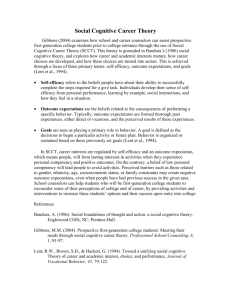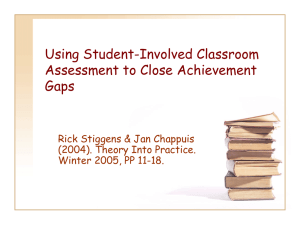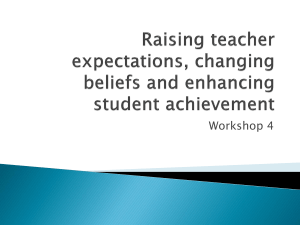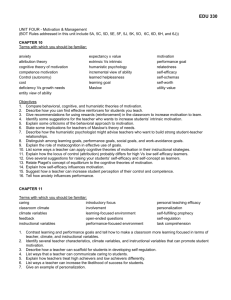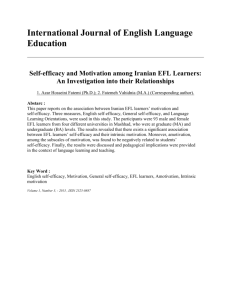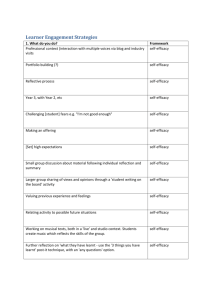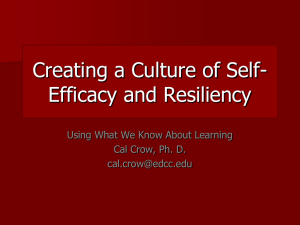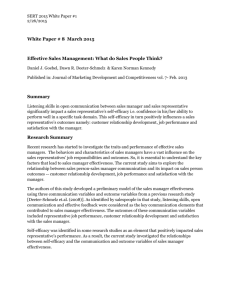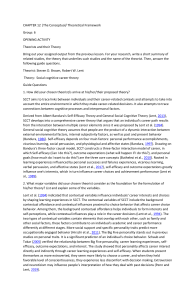Slide #1 CAREER DEVELOPMENT MODELS (continued)
advertisement
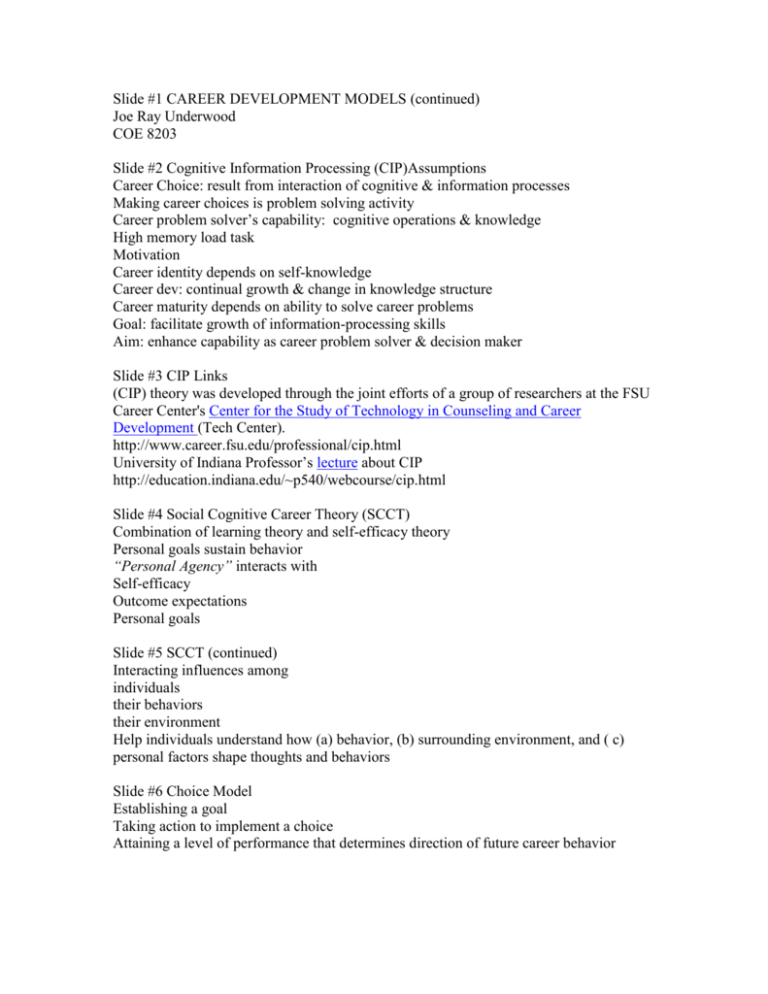
Slide #1 CAREER DEVELOPMENT MODELS (continued) Joe Ray Underwood COE 8203 Slide #2 Cognitive Information Processing (CIP)Assumptions Career Choice: result from interaction of cognitive & information processes Making career choices is problem solving activity Career problem solver’s capability: cognitive operations & knowledge High memory load task Motivation Career identity depends on self-knowledge Career dev: continual growth & change in knowledge structure Career maturity depends on ability to solve career problems Goal: facilitate growth of information-processing skills Aim: enhance capability as career problem solver & decision maker Slide #3 CIP Links (CIP) theory was developed through the joint efforts of a group of researchers at the FSU Career Center's Center for the Study of Technology in Counseling and Career Development (Tech Center). http://www.career.fsu.edu/professional/cip.html University of Indiana Professor’s lecture about CIP http://education.indiana.edu/~p540/webcourse/cip.html Slide #4 Social Cognitive Career Theory (SCCT) Combination of learning theory and self-efficacy theory Personal goals sustain behavior “Personal Agency” interacts with Self-efficacy Outcome expectations Personal goals Slide #5 SCCT (continued) Interacting influences among individuals their behaviors their environment Help individuals understand how (a) behavior, (b) surrounding environment, and ( c) personal factors shape thoughts and behaviors Slide #6 Choice Model Establishing a goal Taking action to implement a choice Attaining a level of performance that determines direction of future career behavior Slide #7 SSCT Pathways to Career Choice Self-efficacy & outcome expectations promote career-related interests Interests influence goals Goal-related actions lead to performance expectations Outcome determines future paths Establish career direction or redirect goals Slide #8 SSCT Applications Educational programs to promote developing interests, values, & talents Present array of occupations that correspond with abilities and values Occupational sort cards Overcome barriers to success Design skill programs that provide self-efficacy enhancement, realistic outcome expectations, and goal-setting skills Slide #9 Brown’s Values-Based, Holistic Model of Career and Life-Role Choices and Satisfaction Values are developed through interaction in inherited characteristics and experience Value-laden messages may contain contradiction while some developed values may conflict with others Values are prioritized and crystallized at any given time in their development but processing of values may be greatly affected by an individual’s cognitive clarity Slide #10 Brown . . . (continued) Interests play minor role Crystallized (cemented) value: I want to do this because . . . Individuals prioritize only small number of values Life satisfaction depends on life roles that satisfy all essential values Slide #11 Brown . . . (continued) Highly prioritized values most important in life role choices if: One option available to satisfy life-role value Options to implement life-role values clearly delineated Same difficulty level of implementing each option Role’s salience directly related to degree of satisfaction of essential values Slide #12 Brown . . . (continued) Values acquired through learning from value-laden information in environment Cognitively processed while interacting with inherited characteristics Cultural background, gender, and socioeconomic levels influence social interactions Success in life-role combination of learned skills and aptitudes (physical, affective, cognitive) Slide #13 Questions for Career Counselors (according to Brown) Are there mood problems that will interfere with decision making? (Anxiety, depression, concerns) Are the relationships between career and life roles clear (to the client)? Is there evidence that values have been crystallized and prioritized? (Why do you believe that?) Slide #14 A Contextual Explanation of Career Constructivism Individuals construct their own way of organizing information Truth or reality is a matter of perception As people and environments interact, development may proceed in many pathways Interactions provide a foundation for individuals to form their own development Slide #15 Application of Contextual Theory Be aware of client’s conceptualizations, concepts, & constructs during counseling Help clients become aware of their constructs by offering support Assist clients to construct a narrative Frequently mentioned topics Discussion of narrative to discover “context” of life Through joint activity, develop goals Slide #16 Self-Efficacy Theory Individual’s belief in her/his ability to perform certain tasks determines whether the individual will attempt those tasks and how well she/he will perform Self-efficacy determines the intensity of an individual’s effort Slide #17 Self-Efficacy Versus Contextual Explanation Self-efficacy concepts include: Inefficacious thinking weakens motivation & undermines performance Viewed as a set of beliefs about a performance domain Individuals limit career choice because of low self-efficacy Contextual explanation concepts include: Actions manifest behavior, are internal processes, and have social meaning Environmental actions to be observed from “wholeness” of events Events take shape as people engage in them: actions & events influence participation Slide #18 Convergence of Career Theory (support) Isolate vocational psychology from other psychological disciplines Different theories provide limited beneficial results for clients Avoid different operational definitions of the the same terminology Unification would promote better research Slide #19 Convergence of Career Theory (against) Discourage formation of new theory (creativity) Empirical base currently lacking Should be empirical question not literary Could lead to ambiguous constructs (many theories) Constructive, piecemeal theory is better Might force political agendas on theory Committees cannot construct theories Unification in terminology possible, not likely with philosophy or theory Modern approaches support pluralism not unity Research may overlook interesting aspects of individual theory
